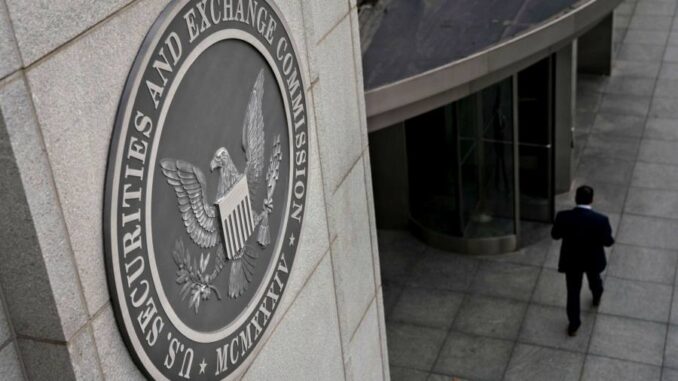
The institutionalisation of cryptocurrencies continues at pace.
The latest development: we have learned that some alt-coins are securities, because you can catch SEC charges for insider-trading them. (Criminal charges too, though that’s a different matter.)
The US Securities and Exchange Commission has charged a few lads with trading alt-coins ahead of their listings on Coinbase Global’s exchanges, which pretty reliably caused a bump in the coin price. And the US attorney in the Southern District of New York is bringing criminal charges against the trio, claiming the wire-fraud charges are its “first ever” insider-trading tipster case in cryptocurrency markets. (Contrast that with its “first ever digital asset” insider-trading case, where the guy with the inside information was trading on his own.)
Ishan Wahi, a 32-year-old who was product manager at Coinbase until May of this year, is accused of sending tips about coin listings to his brother Nikhil Wahi, 26, and a friend named Sameer Ramani, age 33. US authorities say in their complaints that the pair bought coins ahead of the listings and sold them after, usually at a profit.
None of this activity fell anywhere close to a grey area for Coinbase, as the complaints say employees were repeatedly informed that this type of trading and disclosure was not permitted. From the SEC’s complaint:
At all relevant times, Coinbase’s employee policies stated that “material nonpublic information” included “information about a decision by Coinbase to list, not list, or add features to a Digital Asset [separately defined to include tokens].” The policies further emphasised that Coinbase employees should never disclose material, nonpublic information to any other person, including family and friends, or tip others who might make a trading decision using that material, nonpublic information.
But the SEC’s reach doesn’t extend as far as you** might think.
While the trio allegedly traded 25 tokens ahead of their listing announcements, the SEC is only arguing that nine of them were securities. Also from the SEC complaint, with our emphasis:
Throughout the relevant period, Nikhil and Ramani repeatedly traded ahead of Coinbase listing announcements, trading in at least 25 tokens . . . this repeated pattern of Ishan tipping Nikhil and Ramani with inside information, followed by Nikhil and Ramani trading on that information, included trading in at least nine crypto asset securities, which were listed in seven of these announcements.
Those tokens are: Amp, Rally, DerivaDAO, XYO, Rari Governance Token, LCX, Powerledger, DFX Finance and Kromatica.
This brings us back to our old friend the Howey test. As we learned from the DAO and our Alphachain project, that test creates a few standards that a token needs to meet before it can be considered a security.
In other words, big congrats to the folks who run AMP, RLY, DDX, XYO, RGT, LCX, POWR, DFX and KROM! The SEC says it’s reasonable for investors to expect to make money based on your managerial efforts. You were able to list a security without the messy initial public offering process!
Does this mean that these trades would be allowed in tokens that aren’t securities?
Well, there is one big reason it’s a bad idea: the Department of Justice’s filing doesn’t include arguments about the regulatory status of the tokens at all, because as we all know, wire fraud charges cover a wide array of financial crimes.
So if you’re going to try to pull this type of scheme off*, you would need to avoid communicating with anyone electronically in interstate or foreign commerce, while using online digital-asset trading platform Coinbase, which has offices in Chicago, New York, Portland, London, Dublin and Tokyo.
You also probably wouldn’t want to use a foreign phone as an alleged way to escape attention from US authorities. Or to allegedly try to flee the country when you suspect you’re about to get in trouble. From the filing, with our emphasis:
Ishan repeatedly tipped his brother, Nikhil, and his close friend, Ramani, with material, nonpublic information about those listings’ timing and content. Ishan communicated by phone and text with both Nikhil and Ramani during 2021 and 2022, including exchanging phone calls and messages with both that would not be captured in US phone company records because, among other things, Ishan was using a phone with a non-U. S. phone number (the “Foreign Phone”). For example, on October 20, 2021, the same day as a Coinbase listing announcement, Nikhil messaged Ishan’s Foreign Phone a dollar sign and the eyes emoji: “$ 👀👀.” . . .
Nikhil’s and Ramani’s suspicious trading drew attention. On May 11, 2022, Coinbase’s Director of Security Operations emailed Ishan to schedule an interview with Coinbase’s Legal Department in connection with an “ongoing company investigation into Coinbase’s asset listing process.” Ishan — using the Foreign Phone — then sent a screen shot of the interview request to both Nikhil and Ramani, and stated that he needed to speak with them urgently. On Monday, May 16 — the day of his scheduled interview — Ishan emailed coworkers that he would be “out indefinitely” because he “had to fly back to India overnight.” Ishan did not appear for his scheduled interview, but was prevented from leaving the country by law enforcement. Using the Foreign Phone, Ishan tried to call both Nikhil and Ramani several times on May 16.
*Please do not do this.
**The “you” in this case is not 1) a lawyer, 2) interested in jurisdictional issues of securities law, or 3) following the ongoing and long-term debate about whether various crypto tokens/vehicles are securities. We are aware that the SEC doesn’t charge people with insider trading or fraud in things that aren’t securities.






Be the first to comment